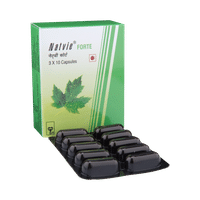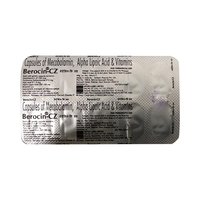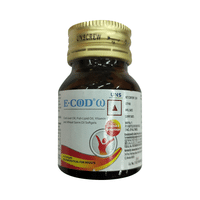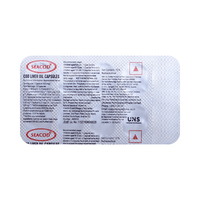Rs.14.80for 1 tube(s) (3 gm Eye Ointment each)
एट्रोफीन सुल्फेट आँख का मलहम के लिए भोजन प्रभाव
एट्रोफीन सुल्फेट आँख का मलहम के लिए शराब प्रभाव
एट्रोफीन सुल्फेट आँख का मलहम के लिए गर्भावस्था प्रभाव
एट्रोफीन सुल्फेट आँख का मलहम के लिए स्तनपान प्रभाव
भोजन
शराब
गर्भावस्था
स्तनपान
No interaction found/established
No interaction found/established
गर्भावस्था के दौरान एट्रोफीन सुल्फेट 1% W/W आँख का मलहम का इस्तेमाल करना असुरक्षित हो सकता है।
जानवरों पर किए गए अध्ययनों से पता चलता है कि गर्भ में पल रहे शिशु पर इसका बुरा असर पड़ता है, हालांकि, इस विषय पर सीमित मानव अध्ययन किए गए हैं। गर्भवती महिलाओं में खतरे के बावजूद इसका इस्तेमाल फायदेमंद हो सकता है। कृपया अपने डॉक्टर की सलाह लें।
जानवरों पर किए गए अध्ययनों से पता चलता है कि गर्भ में पल रहे शिशु पर इसका बुरा असर पड़ता है, हालांकि, इस विषय पर सीमित मानव अध्ययन किए गए हैं। गर्भवती महिलाओं में खतरे के बावजूद इसका इस्तेमाल फायदेमंद हो सकता है। कृपया अपने डॉक्टर की सलाह लें।
CONSULT YOUR DOCTOR
स्तनपान या ब्रेस्टफीडिंग के दौरान एट्रोफीन सुल्फेट 1% W/W आँख का मलहम का इस्तेमाल करना पूरी तरह सुरक्षित है। इंसानों पर किये अध्ययनों से पता चलता है कि ना तो यह दवा मां के दूध में प्रवेश करती है ना ही यह बच्चे को किसी तरह का नुकसान पहुंचाती है।
SAFE IF PRESCRIBED
एट्रोफीन सुल्फेट 1% w/w आँख का मलहम की लवण सम्बन्धी जानकारी
Atropine(1% w/w)
एट्रोफीन सुल्फेट आँख का मलहम का उपयोग
एट्रोफीन सुल्फेट 1% W/W आँख का मलहम का इस्तेमाल हृदय की धड़कन असामान्य रूप से धीमी होना में किया जाता है
एट्रोफीन सुल्फेट आँख का मलहम कैसे काम करता है
एट्रोपिन, एंटीकोलाइनर्जिक दवा नामक दवाओं की एक श्रेणी से सम्बन्ध रखता है। यह शरीर में केमिकलों (एसिटाइलकोलिन) के क्रियाकलाप को अवरुद्ध करता है, इस तरह यह तरह-तरह के प्रभाव डालता है जैसे लार और अन्य शारीरिक स्राव को कम करना, मरोड़ के कारण होने वाले पेट दर्द से राहत दिलाना, दिल की धड़कन में वृद्धि, और आँखों की पुतली का चौड़ा होना।
एट्रोफीन सुल्फेट आँख का मलहम के सामान्य दुष्प्रभाव
सूखा मुँह, हृदय दर में वृद्धि , तमतमाहट , पेशाब करने में कठिनाई, कब्ज, धुंधली दृष्टि
एट्रोफीन सुल्फेट आँख का मलहम का विकल्प
कोई विकल्प नहीं मिलाएट्रोफीन सुल्फेट 1% w/w आँख का मलहम के लिए अक्सर पूछे जाने वाले सवाल
Atropine
Q. In what condition Atropine Sulphate 1% Eye Ointment should not be used?
Atropine Sulphate 1% Eye Ointment should not be used if you have or suspect you have glaucoma (high pressure in the eye) since it can increase the pressure in the eye, or if you are having any eye infection.
Q. Does Atropine Sulphate 1% Eye Ointment cause blurred vision?
When you instill the eye drops for the first time, it can make your eyes watery and may sometimes cause blurred vision. If this happens, it will quickly clear. Make sure you can see again before you drive, or use tools or machines.
Q. When should I seek a doctor’s advice?
You should contact your doctor immediately if you develop an eye infection, conjunctivitis, or an eyelid reaction. Also, you should inform the doctor if you have an eye injury or eye surgery. Discuss with your doctor if you have to continue using Atropine Sulphate 1% Eye Ointment.





















